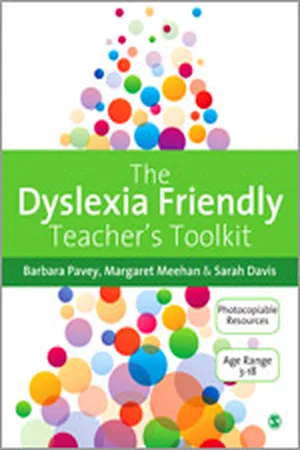
The Dyslexia-Friendly Teacher′s Toolkit
Strategies for Teaching Students 3-18
- 128 pages
- English
- ePUB (mobile friendly)
- Available on iOS & Android
The Dyslexia-Friendly Teacher′s Toolkit
Strategies for Teaching Students 3-18
About this book
In this toolkit the authors provide you with the foundations for making your setting and your teaching style dyslexia-friendly. There is a general overview of the principles and practices required, and what the dyslexia-aware teacher needs to bear in mind.
Chapters cover:
- understanding learners with dyslexia
- dyslexia and phonics
- dyslexia and English as an Additional Language
- dyslexia and mathematics
- dyslexia and science
- dyslexia and creativity
Each chapter includes visual chapter overviews, tried and tested strategies for the classroom and the whole school, using technology to help learners, case studies from practice, children?s voices and sources of further information. The book offers you ideas and advice, and will ensure you feel confident you are doing the right things to help overcome barriers to learning.
Barbara Pavey is a lecturer in Higher Education, training dyslexia specialists in the North of England.
Margaret Meehan is Coordinator of Specialist Tuition at Swansea University.
Sarah Davis is an Early Years Leading Teacher working in North Yorkshire.
Frequently asked questions
- Essential is ideal for learners and professionals who enjoy exploring a wide range of subjects. Access the Essential Library with 800,000+ trusted titles and best-sellers across business, personal growth, and the humanities. Includes unlimited reading time and Standard Read Aloud voice.
- Complete: Perfect for advanced learners and researchers needing full, unrestricted access. Unlock 1.4M+ books across hundreds of subjects, including academic and specialized titles. The Complete Plan also includes advanced features like Premium Read Aloud and Research Assistant.
Please note we cannot support devices running on iOS 13 and Android 7 or earlier. Learn more about using the app.
Information
Table of contents
- Cover Page
- Title
- Copyright
- Contents
- List of figures and tables
- List of abbreviations
- About the authors
- Acknowledgements
- Introduction
- 1. Understanding learners with dyslexia
- 2. Supporting learning
- 3. Dyslexia and phonics
- 4. Dyslexia and English as an additional language
- 5. Reading, writing and spelling
- 6. Dyslexia and mathematics
- 7. Dyslexia and science
- 8. Dyslexia and creativity
- Appendix: A Dyslexia-friendly school – a practitioner’s guide
- References
- Index